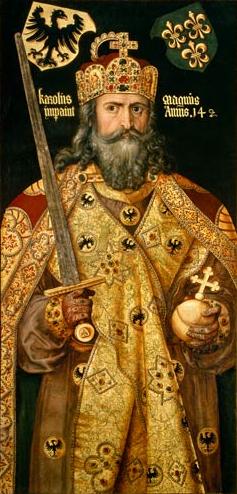 European Rationalism * "Our Pub" Library
European Rationalism * "Our Pub" Library
The emergence by Witold Marciszewski |
|
What relation does hold between the concept of emergence, basic for theories of dynamic complexity, and the idea of culture-forming role of political empires?
Charlemagne's figure in Emperor's Majesty, as visualized by Albrecht Dürer, should direct our attention to the enormous role of giant empires for emergence of civilizations. Especially with respect to Charlemagne's idea to revive the Roman empire in Europe on new civilizational (meaning Christian in that time) foundations. This idea was at the start of the European story of civilization. Its happy end we may figure as the unified Europe's empire. [To be continued] |
